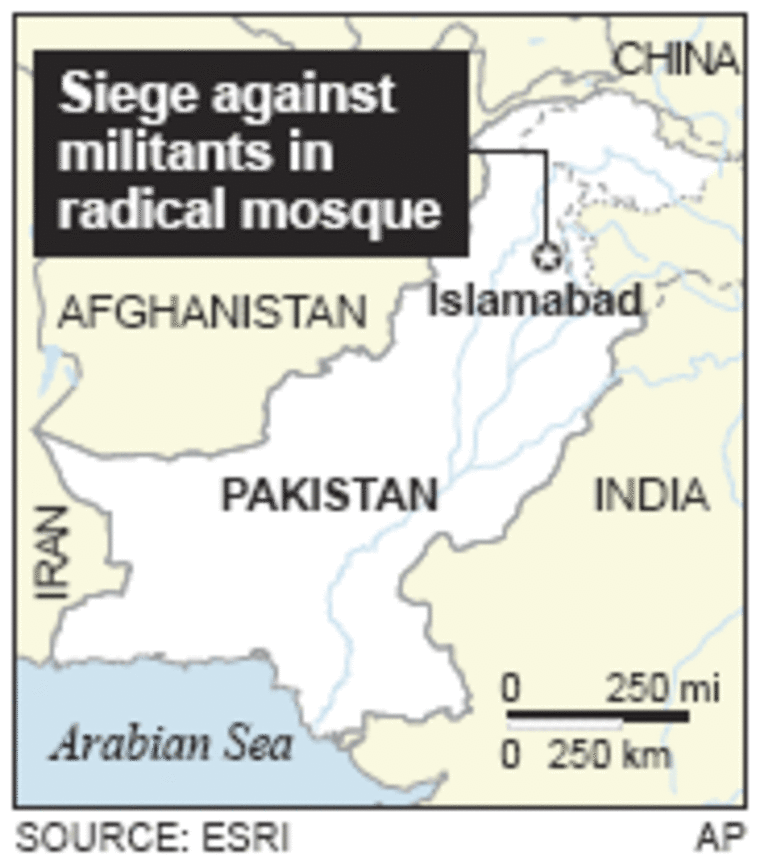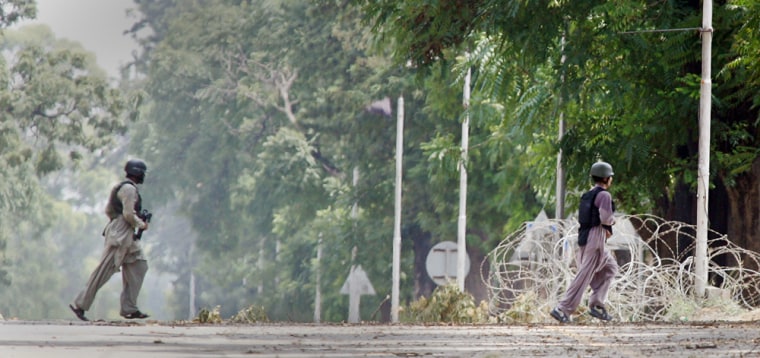Pakistani commandos blew holes in the walls of a mosque compound on Sunday in hope hundreds of women and children could escape, while security forces besieged a revolutionary cleric leading Islamist gunmen inside.
Troops have surrounded the Lal Masjid, or Red Mosque, in Islamabad since Tuesday when clashes between armed students and security forces began after months of tension.
The known death toll in the standoff was least 21, after a lieutenant-colonel was killed as commandos came under heavy fire from the compound housing the mosque and a girls' madrasa (Islamic religious school), called Jamia Hafsa.
Abdul Rashid Ghazi, the cleric leader of the Taliban-style movement, told Pakistani television channels more than 300 followers, mostly female students, were killed in overnight gunbattles. Information Minister Mohammad Ali Durrani said Ghazi was lying.
From daybreak to early afternoon gunfire in the mosque area was light and intermittent.
A day earlier, President Pervez Musharraf warned the militants they would be killed unless they surrendered.
Cleric: 'Martydom' preferable
Ghazi has said he would prefer "martyrdom", and on Sunday newspapers carried a statement from the rebel cleric in which he said he and his followers hoped their deaths would spark an Islamic revolution in Pakistan.
"We have firm belief in God that our blood will lead to a revolution," wrote Ghazi, whose movement is symptomatic of militancy and extremism seeping into Pakistani cities from tribal areas near the Afghan border.
'Shown patience'
Security forces have not mounted a full-scale assault on the compound because of fears for the safety of hundreds of women and children the government says are being held as human shields.
Officials said they did not know how many people remained inside but there could be up to 2,000.
Fifty to 60 hard-core militants were believed to be leading the fighting, officials said.
"We've shown great patience because we don't want people to be killed," said General Musharraf, who is also army chief.
Instead, troops have been blasting holes in the wall to provide escape routes for those inside.

Gunfire erupted shortly after 1 a.m. (1600 ET on Saturday) and about 20 minutes later three big blasts sounded across the capital as the commandos blew up the wall of the madrasa.
"We've already made four or five holes and tonight also two or three holes were made," Major General Waheed Arshad said.
About 1,200 students left the mosque after the clashes began but only about 20 have come out since Friday. Waheed said several had slipped out of the breaches troops were making.
While some women and children may been coerced into staying, there are women who have been among the most fervent supporters of Ghazi and his elder brother Abdul Aziz, who was caught on Wednesday trying to escape.
Ghazi denied children were being used as human shields.
Suicide attacks threatened
His brother Aziz claimed female followers had been trained at a secret location how to use chemical weapons, in an interview published on Sunday by Saudi-owned pan-Arab newspaper Asharq al-Awsat, though conducted before the siege began.
The brothers have threatened to unleash suicide attacks in the past.
Water, gas and power to the mosque were cut and food was said to be running short. Security forces have occupied another city madrasa linked to the Lal Masjid.
The Lal Masjid has been a hotbed of militancy for years, known for its support for the Taliban in Afghanistan and opposition to Musharraf's backing for the U.S.-led campaign against terrorism.
Many Pakistanis support the action against the hardliners whose behavior, including a vigilante campaign against perceived vice, raised concern about the spread of militant Islam.
Islamist politicians have called for an end to the siege and for Ghazi to send out the women and children.
